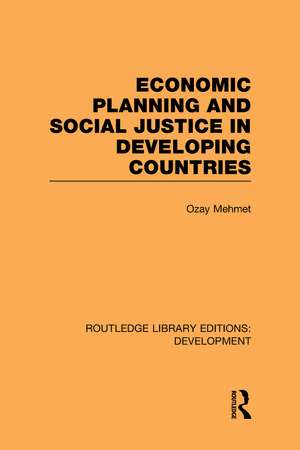Economic Planning and Social Justice in Developing Countries
Autor Ozay Mehmeten Limba Engleză Hardback – 26 noi 2010
Higher production and better income distribution were inseparable twin objectives of developing nations. That meant, production of a higher national output must at the same time promote social justice. Investment must create adequate jobs so that new entrants into rapidly expanding labor force could be gainfully employed. Yet, the dominant (Western) theories of development at the time, in particular the Trickle Down Theory of Growth, prescribed "Growth First, Distribution Later" strategy. Similarly, Import Substitution Industrialization theories were emphasized at the expense of export-led growth. Dualistic Growth theories preached urban-biased, anti-rural development.
This book was written as a rebuttal of such faulty theorizing and misguided professional technical assistance and the book’s message is no less valid today than in the 1970’s.
| Toate formatele și edițiile | Preț | Express |
|---|---|---|
| Paperback (1) | 413.33 lei 43-57 zile | |
| Taylor & Francis – 7 apr 2015 | 413.33 lei 43-57 zile | |
| Hardback (1) | 824.17 lei 43-57 zile | |
| Taylor & Francis – 26 noi 2010 | 824.17 lei 43-57 zile |
Preț: 824.17 lei
Preț vechi: 1241.86 lei
-34% Nou
Puncte Express: 1236
Preț estimativ în valută:
157.71€ • 165.07$ • 131.26£
157.71€ • 165.07$ • 131.26£
Carte tipărită la comandă
Livrare economică 31 martie-14 aprilie
Preluare comenzi: 021 569.72.76
Specificații
ISBN-13: 9780415596114
ISBN-10: 0415596114
Pagini: 284
Dimensiuni: 156 x 234 mm
Greutate: 0.69 kg
Ediția:1
Editura: Taylor & Francis
Colecția Routledge
Locul publicării:Oxford, United Kingdom
ISBN-10: 0415596114
Pagini: 284
Dimensiuni: 156 x 234 mm
Greutate: 0.69 kg
Ediția:1
Editura: Taylor & Francis
Colecția Routledge
Locul publicării:Oxford, United Kingdom
Cuprins
Part I: Economic Growth Without Social Justice 1. What was Wrong with Post-war Planning in LDCs? 2. Distribution Effects of Growth: the Evidence 3. Absolute Poverty: Measurement and Identification 4. The Unemployment Problems of the LDCs Part II:Some Case Studies of the Influence of Elites on Economic Planning and Policy 5. Malaysia: From Colonial to Bumiputra Elitism 6. Liberia: The Americo-Liberian Elite 7. Revolution or Reform: The Experience of Pakistan, Brazil and Uganda Part III: Egalitarian Planning and Reform in LDCs 8. Towards More Egalitarian Development Planning 9. An Egalitarian Development Policy Based on Manpower Planning 10. Education Planning: Shifting from Elitist to Egalitarian Principles 11. Egalitarian Planning and Rural Development 12. Global Equity: Reforming the International Trade and Aid System 13. Summing up: Egalitarian Planning as a Non-violent Revolution
Descriere
First published in 1978, this book assess the impact post-war strategies of Gross National Product maximation upon the development of LDCs, arguing that development in LDCs cannot proceed in a sequential path – with income growth first first and distribution after. The author posits the need for a more egalitarian development strategy and decentralised economic planning, responsive to the needs of rural communities.

























